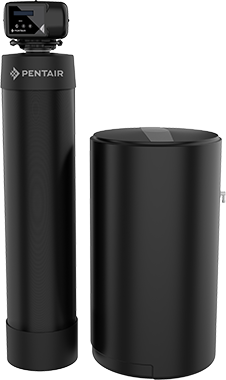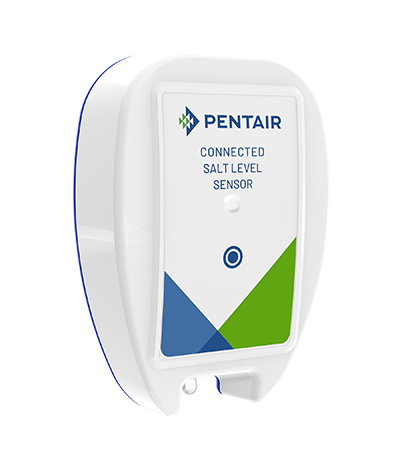- Water Softening & Filtration
- Products
- Water Softeners
- Water Softeners
OVERVIEW
Benefits of a Water Softener
Hard water levels can range from low to very high hard water. Homeowners with any level of hard water can face issues like prematurely broken water heaters and persistent scaling, spotty dishes and glassware, dingy and stiff laundry, itchy skin, and dull hair. With a Pentair Water Softener, you can reduce the havoc hard water can cause to your home and can save salt and water with our on-demand regeneration feature. When you insist on Pentair, you can expect better quality water from every tap in your home. Pentair recommends that you test your water hardness levels using our 16-Point Rapid Water Test to ensure the water softener is right for your home water. Additional features include:
- Simple, electronic system for easier programming
- Self-cleaning brine injector reduces maintenance
- Only regenerates when needed, saving salt and water
- Singular rotary disc seal means longer product life and less maintenance
- Remote monitoring and low-salt level alert when paired with the Connected Salt Level Sensor and the Pentair Home App

Improve Appliance Efficiency

Enjoy Softer Laundry

Reduce Scale Buildup

Limit Water Spots on Glassware
How it works

-
Softening
-
Occurs when water passes through the mineral tank where positively-charged calcium and magnesium ions are exchanged with sodium onto the negatively-charged resin beads. The calcium and magnesium are retained on the media within the resin tank while the remainder of the water with sodium ions flows into the home, resulting in softened water. Eventually, all sodium ions are exchanged with the magnesium and calcium on the resin beads fill with calcium and magnesium and need to be regenerated.
-
Regeneration
-
The mineral tank is recharged with sodium from the brine tank solution and displaces calcium and magnesium, which is flushed down the drain during the backwashing phase.
-
Backwashing
-
At the end of the regeneration process, this stage is a final removal of the hardness ions and dirt that has accumulated in the mineral tank and flushes to the drain.
-
Rinse
-
The mineral tank is rinsed with fresh water and loads the brine tank so that it is ready for the next softening cycle.
-
Controller
-
Recharging cycles are controlled by the electronic meter on the top of the tank. This can be set to recharge every specified number of days or as the electronic head recognizes that a certain amount of water has been used.
Water Softeners Comparison
| Carbon Water Filter & Water Softener Combo System | Water Softener | ||
| Whole home solution | X | X | |
| Electronically programmable | X | ||
| Neutralizes ions, leaving in beneficial minerals |
X | ||
| On-demand water regeneration reduces waste water |
X | ||
| No electricity required to operate |
X | ||
| Multiple sizes available for any size home | X | X | |
| No salt refills necessary | X | ||
| Indoor/Outdoor Installation | X | X | |
| Material | Stainless Steel | Fiberglass | |
| Reduces foul taste and odor associated with chlorine | X | ||
| Optional Connectivity to Pentair Home App when paired with the Connected Salt Level Sensor | X | ||
| Effective on Hard to Moderately Hard Water | X | ||
| Removes mineral ions, like calcium and magnesium, from water | X | ||
| Explore Products | Carbon Water Filter & Water Softener Combo System | This Product |
Resources
Downloads
Certifications
Warranty
FAQs

NSF/ANSI 44 for specific performance claims as verified and substantiated by test data.
View the comprehensive systems warranty policy here.
Frequently Asked Questions
-
Where does the mineral content in my water go?
-
The exchanged ions are flushed down your drain. Our minimal backwashing wastes less water.
-
If I’m on a sodium-restricted diet or suffer from hypertension, is there a substitute for salt that I can add to Pentair Water Softeners?
-
Yes, you can use potassium chloride instead of salt. Potassium chloride is a more expensive alternative, but it is worth the cost when you consider the benefits.
Most public water supplies contain less than 20 mg/L of sodium, according to the World Health Organization. Using salt-based softeners can raise the sodium concentration above this level. The Environmental Protection Agency (EPA) recommends that the sodium in your drinking water not exceed 20 mg/L if you’re on a restricted sodium intake diet, as defined by the EPA. Individuals on a very low-sodium diet and concerned about the amount of sodium in softened water should consider using potassium chloride instead of salt.
-
How much maintenance is required?
-
Little maintenance is needed to keep your water softeners functioning smoothly. Salt does need to be refilled as it is depleted and filters and media should be replaced as indicated in your owner’s manual.
-
How much salt is added to my water from Pentair Water Softeners?
-
It depends on the hardness level of the original water. For example, drinking a quart of softened water with a hardness of 20 grains of hardness will add 150.0 milligrams/quart, of sodium the equivalent of less than a tablespoon of ketchup or a slice of white bread.
-
What type of salt should I use in Pentair Water Softeners?
-
It is recommended that block or solar salt be used in this system.











